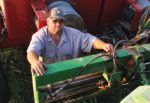Advertise Follow Us
Items Tagged with 'companion cropping'
ARTICLES
Even in a Serious Drought, Soil Never Rests on No-Tiller’s Farm
Once-aspiring microbiologist pampers soil microbiome to push production.
Read More
Digging Up Soil Health, Profitability with ‘Biotic’ Farming
Brendon Rockey turned to companion cropping, covers, compost applications and livestock to regenerate soils on his potato farm in a dry, arid environment.
Read More
U.K. Grower Shares Success Stories from His Conversion from Full Tillage to Direct Drilling
Reports of his retirement have been greatly exaggerated as David White is direct drilling various crops on light ‘boys’ land near Cambridge, England.
Read More
Embracing the No-Till ‘Greenhouse’ Effect
From interseeding to relay cropping to ‘engineering by inventory,’ Loran Steinlage is building a profitable, divergent no-till operation
Read More










